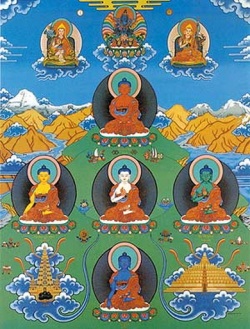Difference between revisions of "Tirokuḍḍasuttaṁ: The Beyond the Walls Discourse"
(Created page with "<nomobile>{{DisplayImages|1856|47|3290|4523|158}}</nomobile> {{Centre|<big><big>Tirokuḍḍasuttaṁ<br/> The Beyond the Walls Discourse </big></big>}} <poem> 1. Tiroku...") |
|||
| Line 11: | Line 11: | ||
2. Pahūte annapānamhi, khajjabhojje upaṭṭhite, | 2. Pahūte annapānamhi, khajjabhojje upaṭṭhite, | ||
| − | But when abundant food and drink, both staple and non-staple, is prepared, | + | But when abundant [[food]] and drink, both staple and non-staple, is prepared, |
| − | na tesaṁ koci sarati sattānaṁ kammapaccayā. | + | na tesaṁ koci [[sarati]] sattānaṁ kammapaccayā. |
| − | no one remembers these beings, because of their (past unwholesome) deeds, | + | no one remembers these [[beings]], because of their ({{Wiki|past}} [[unwholesome]]) [[deeds]], |
3. Evaṁ dadanti ñātīnaṁ ye honti anukampakā, | 3. Evaṁ dadanti ñātīnaṁ ye honti anukampakā, | ||
| − | Thus those who are compassionate give to their (departed) relatives, | + | Thus those who are [[compassionate]] give to their (departed) relatives, |
| − | suciṁ paṇītaṁ kālena, kappiyaṁ pānabhojanaṁ. | + | suciṁ paṇītaṁ [[kālena]], kappiyaṁ pānabhojanaṁ. |
| − | at the right time, pure, excellent, suitable drink and food. | + | at the right time, [[pure]], {{Wiki|excellent}}, suitable drink and [[food]]. |
4. “Idaṁ vo ñātinaṁ hotu, sukhitā hontu ñātayo!” | 4. “Idaṁ vo ñātinaṁ hotu, sukhitā hontu ñātayo!” | ||
| − | (thinking): “May this go to our relatives, may our relatives be happy!” | + | ([[thinking]]): “May this go to our relatives, may our relatives be [[happy]]!” |
Te ca tattha samāgantvā, ñātipetā samāgatā | Te ca tattha samāgantvā, ñātipetā samāgatā | ||
| − | Those who have gathered, the departed relatives who have assembled | + | Those who have [[gathered]], the departed relatives who have assembled |
5. pahute annapānamhi, sakkaccaṁ anumodare: | 5. pahute annapānamhi, sakkaccaṁ anumodare: | ||
| − | around the food and drink, respectfully offer their thanks: | + | around the [[food]] and drink, respectfully offer their thanks: |
| − | “Ciraṁ jīvantu no ñātī! Yesaṁ hetu labhāmase, | + | “Ciraṁ jīvantu no ñātī! Yesaṁ [[hetu]] labhāmase, |
(saying): “ May our relatives live long! Those to whom we owe this gain, | (saying): “ May our relatives live long! Those to whom we owe this gain, | ||
| − | 6. amhākañ-ca katā pūjā, dāyakā ca anipphalā!” | + | 6. amhākañ-ca katā [[pūjā]], dāyakā ca anipphalā!” |
for we have been honoured, those who give are not without reward!” | for we have been honoured, those who give are not without reward!” | ||
| − | Na hi tattha kasī atthi, gorakkh' ettha na vijjati, | + | Na hi tattha kasī [[atthi]], gorakkh' [[ettha]] na vijjati, |
| − | For in that place there is no ploughing, and cattle-rearing is not found there, | + | For in that place there is no {{Wiki|ploughing}}, and cattle-rearing is not found there, |
| − | 7. vaṇijjā tādisī n' atthi, hiraññena kayakkayaṁ. | + | 7. vaṇijjā tādisī n' [[atthi]], hiraññena kayakkayaṁ. |
| − | similarly there is no trading, or buying and selling of gold. | + | similarly there is no trading, or [[buying and selling]] of {{Wiki|gold}}. |
Ito dinnena yāpenti, petā kālakatā tahiṁ. | Ito dinnena yāpenti, petā kālakatā tahiṁ. | ||
| − | The departed in that place who have died, (have to) subsist on gifts. | + | The departed in that place who have [[died]], (have to) subsist on gifts. |
| − | 8. Unname udakaṁ vaṭṭaṁ, yathā ninnaṁ pavattati, | + | 8. Unname udakaṁ vaṭṭaṁ, [[yathā]] ninnaṁ pavattati, |
| − | Just as water that rains on the highlands, flows down to the lowlands, | + | Just as [[water]] that rains on the highlands, flows down to the lowlands, |
evam-eva ito dinnaṁ, petānaṁ upakappati. | evam-eva ito dinnaṁ, petānaṁ upakappati. | ||
| − | so too what has been given here is of benefit to the departed. | + | so too what has been given here is of [[benefit]] to the departed. |
| − | 9. Yathā vārivahā pūrā paripūrenti sāgaraṁ, | + | 9. [[Yathā]] vārivahā pūrā paripūrenti sāgaraṁ, |
| − | Just as rivers that are full (flow and) fill up the ocean, | + | Just as [[rivers]] that are full (flow and) fill up the ocean, |
evam-eva ito dinnaṁ, petānaṁ upakappati. | evam-eva ito dinnaṁ, petānaṁ upakappati. | ||
| − | so too what has been given here is of benefit to the departed. | + | so too what has been given here is of [[benefit]] to the departed. |
10. “Adāsi me, akāsi me, ñātimittā sakhā ca me,” | 10. “Adāsi me, akāsi me, ñātimittā sakhā ca me,” | ||
| − | (Thinking): “He gave to me, he worked for me, he was my relative, my friend, my companion,” | + | ([[Thinking]]): “He gave to me, he worked for me, he was my [[relative]], my [[friend]], my companion,” |
petānaṁ dakkhiṇaṁ dajjā, pubbe katam-anussaraṁ. | petānaṁ dakkhiṇaṁ dajjā, pubbe katam-anussaraṁ. | ||
he should give gifts for the departed, remembering what they have done before. | he should give gifts for the departed, remembering what they have done before. | ||
| − | 11. Na hi ruṇṇaṁ va, soko vā, yā c' aññā paridevanā, | + | 11. Na hi ruṇṇaṁ va, soko vā, yā c' [[aññā]] paridevanā, |
| − | For no tears, or grief, or any other lamentations, | + | For no {{Wiki|tears}}, or [[grief]], or any other [[lamentations]], |
na taṁ petānam-atthāya, evaṁ tiṭṭhanti ñātayo. | na taṁ petānam-atthāya, evaṁ tiṭṭhanti ñātayo. | ||
| Line 71: | Line 71: | ||
12. Ayaṁ kho dakkhiṇā dinnā, Sanghamhi suppatiṭṭhitā, | 12. Ayaṁ kho dakkhiṇā dinnā, Sanghamhi suppatiṭṭhitā, | ||
| − | But that gift that has been given, and well placed in the Sangha, | + | But that [[gift]] that has been given, and well placed in the [[Sangha]], |
| − | dīgharattaṁ hitāya 'ssa, ṭhānaso upakappati. | + | dīgharattaṁ [[hitāya]] 'ssa, ṭhānaso upakappati. |
| − | is of benefit to them for a long time, immediately it is of benefit. | + | is of [[benefit]] to them for a long time, immediately it is of [[benefit]]. |
13. So ñātidhammo ca ayaṁ nidassito - | 13. So ñātidhammo ca ayaṁ nidassito - | ||
| − | This then is the definition of a relative's duties - | + | This then is the [[definition]] of a relative's duties - |
| − | petāna' pūjā ca katā uḷārā, | + | petāna' [[pūjā]] ca katā uḷārā, |
(and by this) great honour has been done to the departed, | (and by this) great honour has been done to the departed, | ||
balañ-ca bhikkhūnam-anuppadinnaṁ, | balañ-ca bhikkhūnam-anuppadinnaṁ, | ||
| − | strength has also been given to the monks, | + | strength has also been given to the [[monks]], |
tumhehi puññaṁ pasutaṁ anappakaṁ! | tumhehi puññaṁ pasutaṁ anappakaṁ! | ||
| − | and no little merit has been produced by you! | + | and no little [[merit]] has been produced by you! |
</poem> | </poem> | ||
{{Centre|Tirokuḍḍasuttaṁ Niṭṭhitaṁ<br/> | {{Centre|Tirokuḍḍasuttaṁ Niṭṭhitaṁ<br/> | ||
Latest revision as of 12:20, 15 May 2015
Tirokuḍḍasuttaṁ
The Beyond the Walls Discourse
1. Tirokuḍḍesu tiṭṭhanti, sandhisiṅghāṭakesu ca,
They stand beyond the walls, and at the junctions and crossroads,
dvārabāhāsu tiṭṭhanti, āgantvāna sakaṁ gharaṁ.
they stand at the door-posts, having come to their (former) homes.
2. Pahūte annapānamhi, khajjabhojje upaṭṭhite,
But when abundant food and drink, both staple and non-staple, is prepared,
na tesaṁ koci sarati sattānaṁ kammapaccayā.
no one remembers these beings, because of their (past unwholesome) deeds,
3. Evaṁ dadanti ñātīnaṁ ye honti anukampakā,
Thus those who are compassionate give to their (departed) relatives,
suciṁ paṇītaṁ kālena, kappiyaṁ pānabhojanaṁ.
at the right time, pure, excellent, suitable drink and food.
4. “Idaṁ vo ñātinaṁ hotu, sukhitā hontu ñātayo!”
(thinking): “May this go to our relatives, may our relatives be happy!”
Te ca tattha samāgantvā, ñātipetā samāgatā
Those who have gathered, the departed relatives who have assembled
5. pahute annapānamhi, sakkaccaṁ anumodare:
around the food and drink, respectfully offer their thanks:
“Ciraṁ jīvantu no ñātī! Yesaṁ hetu labhāmase,
(saying): “ May our relatives live long! Those to whom we owe this gain,
6. amhākañ-ca katā pūjā, dāyakā ca anipphalā!”
for we have been honoured, those who give are not without reward!”
Na hi tattha kasī atthi, gorakkh' ettha na vijjati,
For in that place there is no ploughing, and cattle-rearing is not found there,
7. vaṇijjā tādisī n' atthi, hiraññena kayakkayaṁ.
similarly there is no trading, or buying and selling of gold.
Ito dinnena yāpenti, petā kālakatā tahiṁ.
The departed in that place who have died, (have to) subsist on gifts.
8. Unname udakaṁ vaṭṭaṁ, yathā ninnaṁ pavattati,
Just as water that rains on the highlands, flows down to the lowlands,
evam-eva ito dinnaṁ, petānaṁ upakappati.
so too what has been given here is of benefit to the departed.
9. Yathā vārivahā pūrā paripūrenti sāgaraṁ,
Just as rivers that are full (flow and) fill up the ocean,
evam-eva ito dinnaṁ, petānaṁ upakappati.
so too what has been given here is of benefit to the departed.
10. “Adāsi me, akāsi me, ñātimittā sakhā ca me,”
(Thinking): “He gave to me, he worked for me, he was my relative, my friend, my companion,”
petānaṁ dakkhiṇaṁ dajjā, pubbe katam-anussaraṁ.
he should give gifts for the departed, remembering what they have done before.
11. Na hi ruṇṇaṁ va, soko vā, yā c' aññā paridevanā,
For no tears, or grief, or any other lamentations,
na taṁ petānam-atthāya, evaṁ tiṭṭhanti ñātayo.
are of any use to the departed, as long as their relatives continue (grieving) in this way.
12. Ayaṁ kho dakkhiṇā dinnā, Sanghamhi suppatiṭṭhitā,
But that gift that has been given, and well placed in the Sangha,
dīgharattaṁ hitāya 'ssa, ṭhānaso upakappati.
is of benefit to them for a long time, immediately it is of benefit.
13. So ñātidhammo ca ayaṁ nidassito -
This then is the definition of a relative's duties -
petāna' pūjā ca katā uḷārā,
(and by this) great honour has been done to the departed,
balañ-ca bhikkhūnam-anuppadinnaṁ,
strength has also been given to the monks,
tumhehi puññaṁ pasutaṁ anappakaṁ!
and no little merit has been produced by you!
Tirokuḍḍasuttaṁ Niṭṭhitaṁ
The Beyond the Walls Discourse is Finished




